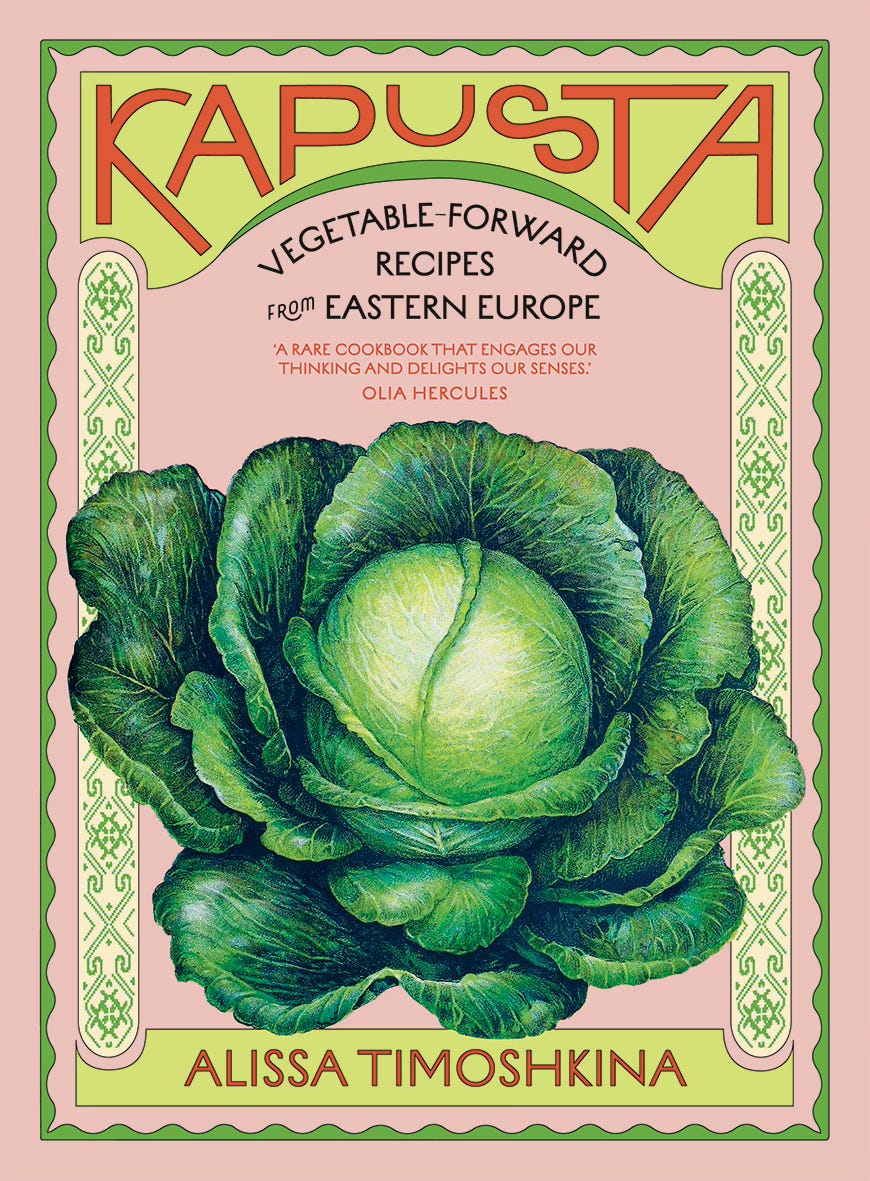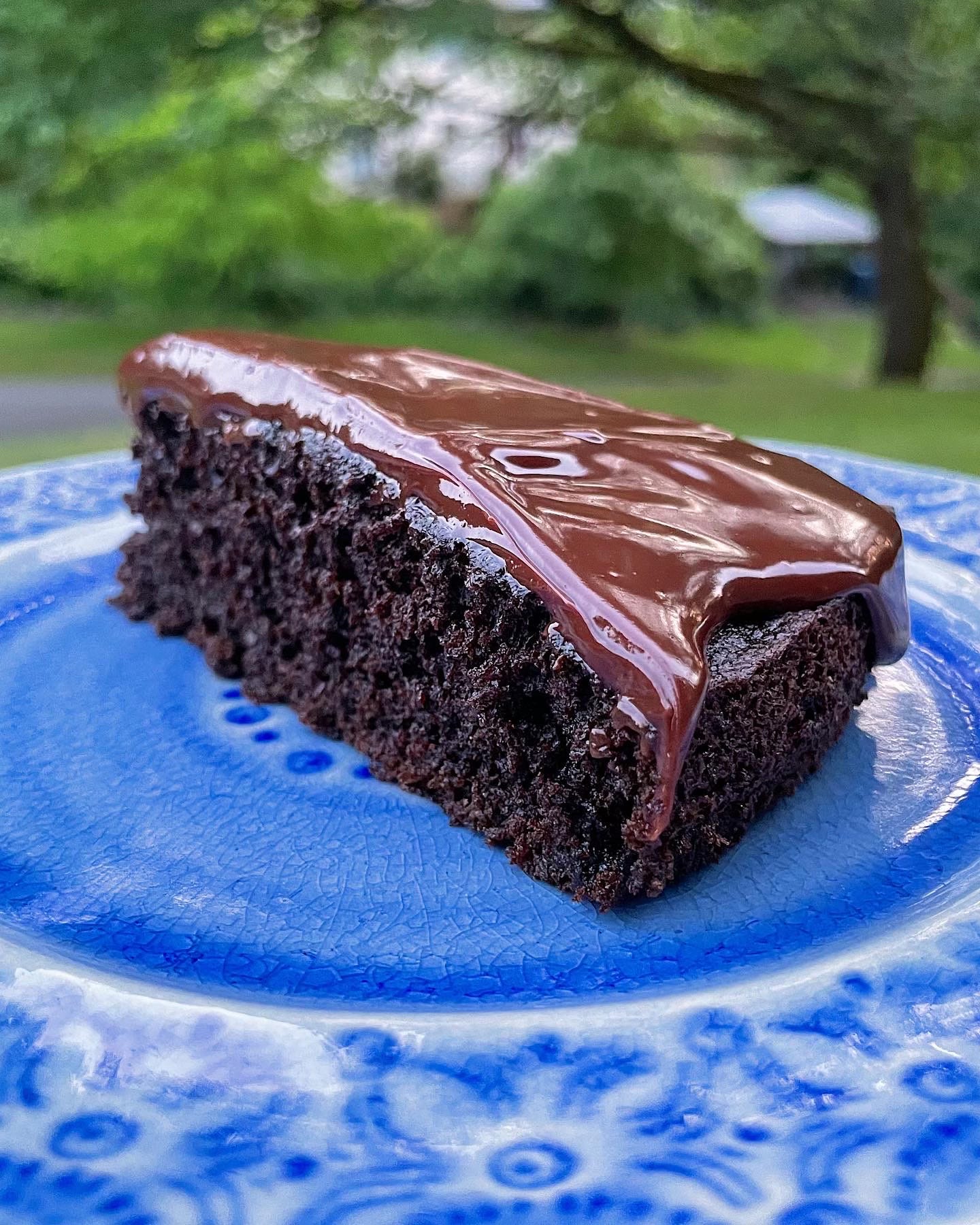Celebrating the Eastern European Kitchen with Alissa Timoshkina's "Kapusta"
Plus a recipe for Beet and Rye Chocolate Cake
Hello and welcome to Chesnok: Notes from a Post-Soviet Kitchen. If you’re here and somehow not already subscribed, well, here you go:
Don’t miss tomorrow’s virtual Author Talk with Alissa Timoshkina to celebrate the publication of her latest book Kapusta: Vegetable Forward Recipes from Eastern Europe. I have the immense privilege of interviewing Alissa and I promise it’ll be a fun, lively conversation. It’s virtual and free to the public, so hopefully see you there! If you can’t make it, a recording will be posted to Youtube afterwards. A big thanks to the lovely folks at Book Larder for hosting the event!
Hello Friends,
How is that January felt like it stretched on and on, and yet February is just blitzing by? At the beginning of the month,I survived handed in my last major round of edits on the book and taught my first in-person cooking class in over 2 years (!) at Milk Street in Boston. I had a day to pack before we left for a much needed break/family vacation to Playa del Carmen (my first time in Mexico, and certainly not my last) with our best friends from Seattle. The warm sun against my skin, shimmering azure blue waters, sandy beaches, spicy margaritas, soo many laughs and tacos! Remind me why I moved to frigid Rhode Island again? Really though, it was just the boost of Vitamin D and good company I needed to help me get through this last stretch of New England winter.
I was back for a few days until I flew out again, this time to LA for a friend’s wedding. I snatched my few hours of down time here and there to write this post. So, while the topic and cuisine feel decidedly wintery, it comes from a warm, inviting place —just like today’s featured book! Enjoy :)
I first became familiar with UK-based author and historian Alissa Timoshkina through her first cookbook, Salt and Time: Recipes from a Russian Kitchen, published in 2019. Or, shall I say, Siberian, as Alissa, of mixed Ukrainian-Jewish background, grew up east of the Urals in Omsk. The writing and the photography in that book are transportive and I love the way Alissa often took the flavors and dishes of her childhood and reimagined them into something a little more dynamic. As someone who grew up on many of the same foods, I found it so refreshing.
At the time, she had also started a podcast called MotherFood, which featured interviews with women who were navigating motherhood as they pursued careers in food, nutrition, and wellness. To be honest, I never quite got into it then, as I was yet a mother myself, and so it didn’t quite resonate—but boy does it now! Alissa talks to some of my favorite women in the food industry about their matrescent journeys and I’ve bookmarked her conversations with Aran Goyoaga, Anja Dunk, Alice Zaslavsky, and Georgina Hayden to listen to when I get the chance.
Fast forward a couple of years and Alissa had just started working on her next cookbook—documenting a culinary journey on the Trans-Siberian Express—when Russia invaded Ukraine in February 2022. The war decisively put an end to that project and Alissa, instead, along with Olia Hercules and the team behind #CookforSyria, poured all her energy into kickstarting the #CookforUkraine fundraising campaign. To date, they have raised over £2.5 million in aid for Ukraine.
As Alissa writes in a recent post, Kapusta (“cabbage” in English) “was born out of the profound heartbreak of the war in Ukraine… and it is full of stories and recipes exploring the magnificent country.” The book celebrates not only Ukraine though, but all of Eastern Europe; exploring its flavors and communities through the lens of its five most common vegetables—cabbage, beetroot, potato, carrot, and mushrooms. There’s a chapter on dumplings (hello, Tatar Manti with Carrots and Pumpkin!) and one on fermentation (aptly featuring no less than 5 types of sauerkraut). As she follows the threads of history behind each dish, it also becomes quickly apparent how much research and thought Alissa poured into this project. It makes it the kind of book I want to both curl up on the couch and jump into the kitchen with.
When Alissa reached out to me back in winter/spring of 2023 to see if I wanted to contribute a cake recipe, I jumped at the chance. The missive was that it needed to have an Eastern European profile and use one of the featured vegetables. My mind immediately jumped to a chocolate rye cake with beets. It’s not a traditional recipe, per se, but it embodies our baking traditions well enough.
Working off the chocolate sour cream loaf cake from my book Everyday Cake, I swapped the sour cream for cooked pureed beets and some rye flour for all-purpose. And instead of mixing with a stand or hand mixer, this iteration only requires a couple bowls and a whisk. Low effort, high reward. I opted for a topping of silky, liqueur-spiked ganache, but it’s equally delicious with a simple dusting of powdered sugar.
To celebrate Kapusta’s US publication, I’m sharing the recipe for the beetroot and rye chocolate cake here—because what’s a party without something sweet? I’m also including a few ~*bonus*~baking notes that didn’t make into the pages. I hope this post inspires you to pick up your own copy of Kapusta or at least check it out from your local library. And, if you can, again, join us for the virtual Author Talk tomorrow at 12pm PST/3pm EST.
Signed copies of Kapusta can be bought from Book Larder (they ship nationwide and international!), but otherwise consider purchasing from your local bookstore. Not only do you support a small business, but you also signal to the bookseller that there’s an interest in the book—which will make them more likely to carry it or buy more copies if they already do! Bookshop (heads up, affiliate link!) is also a good option.
Ukraine needs our support more than ever! If you’re interested in more ways to support Ukrainian people as they fight for peace and sovereignty, here are some great non-profits/campaigns to check out:
Cook for Ukraine/Legacy of War Foundation
World Center Kitchen for Ukraine
Now onto the recipe…
Beetroot and Rye Chocolate Cake
Makes one 8in (20 cm) cake (8−10 SLICES)
From Alissa’s headnote:
Beetroot’s natural sweetness and earthiness makes it a perfect ingredient in cakes, especially those containing chocolate and rye flour. Although this is not a traditional recipe of a specific Eastern European country or region, I felt it held true to the essence of Eastern European baking. It was a pleasure to ask one of my favourite bakers, Polina Chesnakova, to develop this recipe for the book. Polina, like myself, and other contributors to this book, comes from a mixed Eastern European heritage, and now lives in the United States.
INGREDIENTS
½ cup plus 2 tablespoons (80g) all-purpose flour
⅓ cup plus 1 tablespoon (50g) rye flour*
⅓ cup (1 tablespoon) 40g natural cocoa powder
¾ teaspoons baking soda
¾ teaspoon fine sea salt
½ teaspoon instant espresso powder (optional)
½ cup (100g) granulated sugar
½ cup (100g) lightly packed light brown sugar
2 large eggs, room temperature
¾ cup (190g) puréed beets** (from about 2 medium beetroots, cooked and finely
grated or pulsed in a food processor, with excess liquid removed)
½ cup (115g) neutral oil, such as rapeseed (canola)
1 teaspoon vanilla extract
Cocoa (unsweetened chocolate) powder or icing (powdered) sugar, (optional), for dusting
For the Chocolate Ganache (optional):
85g (3oz) dark chocolate, finely chopped
85ml (3fl oz) double (heavy) cream
2 teaspoons clear honey
11/2 teaspoons kirsch, orange liqueur, or other liqueur (optional)
pinch of fine sea salt
INSTRUCTIONS:
Preheat the oven to 350°F (180°C) and grease and line an 8-in (20cm)*** springform round cake tin (pan).
Sift the flours, cocoa powder, baking soda, salt, and, if using, espresso powder into a large bowl. Add both sugars and whisk together to evenly distribute. Use your fingers to break up any clumps.
In a bowl, whisk together the eggs, beetroot purée, oil, and vanilla until smooth. Fold the wet mixture into the flour mixture, until fully incorporated and a smooth batter has formed.
Scrape the batter into the prepared tin. Bake for about 30 minutes, or until a tester inserted in the centre of the cake comes out clean. Transfer to a wire rack and allow the cake to cool completely before transferring to a plate. If not making ganache, dust with cocoa powder or icing sugar****.
To make the chocolate ganache, put the chocolate into a small bowl. In a small saucepan, bring the cream and honey to a simmer over a medium-low heat. Pour the mixture over the chocolate and let sit, undisturbed, for 1 minute. Gently stir until smooth. Stir in the liqueur and salt. You can make this in advance as it will keep for up to 1 week in the fridge, just gently warm through before using.
Slowly pour the ganache evenly over the top of the cake, allowing it to drip down the sides. If you would like, let it set for 30 minutes to an hour before serving. The cake keeps well wrapped at room temperature for 3–4 days.
Baker’s Notes:
*The recipe works with light, medium or wholegrain rye flour!
**I wish I thought of this while developing the recipe, but buying those vacuum-sealed pre-cooked beets from the produce aisle will make baking this cake a BREEZE. The beet flavor is most pronounced the day it is baked but will mellow out as time goes on.
***The cake can also be baked in a 9-in (23 cm) springform or deep cake pan. Reduce baking time by 5 minutes.
****Without the ganache, the cake is dairy-free :)
As always, thank you for reading, subscribing, and sharing. If it’s not too much trouble, please consider “hearting” this post!
Until next time,
Polina








Looks so yummy!
Thank you for all the links to support Ukraine! I was lucky enough to go to Alissa’s house for a Kapusta celebration lunch and everything she and her mom made from the book was amazing